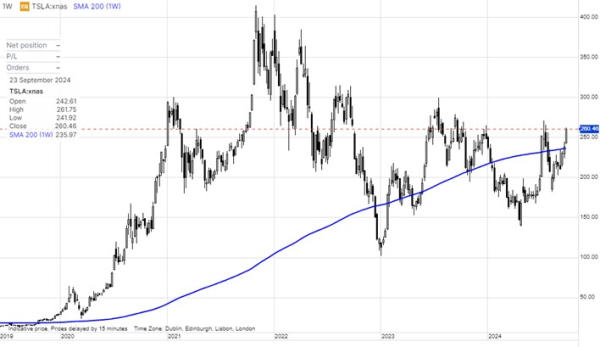US Election Countdown: The election's impact on Tesla
2024 US Election countdown. With only five weeks to go...
The polls this week say:
The oddsmakers this week say:

This week: election odds remain 50-50, Tesla in our sights on Elon Musk's political activism
While Harris continues to enjoy about a 3% advantage in the national polls, the extremely close polling margins in the seven key swing states mean that her odds of winning are stuck around 50-50, according to betting markets. The VP presidential debate this week will likely not sustain any shift in the odds in the runup to the election.
As I have noted before, I suspect the margin of victory will come down to voter turnout. For Harris to win, that will especially mean turning out young voters that have never voted before. For Trump, it will be about motivating those that continue to blame the top two concerns of voters: inflation/the economy and immigration, on the Democrats, fairly or not.
Topic of the week: how might the election impact Tesla?
After declaring himself a centrist a few years ago and claiming he voted for Joe Biden in 2020, Tesla founder and CEO Elon Musk has become loudly anti-establishment and pro-Trump over the last two years. Back in July, Musk pledged $45 million per month to a political action committee (PAC) to back Trump’s presidential run. Such political engagement raises the stakes for Tesla and Musk’s other companies.Chart of the week: Tesla ahead of the US election

Let’s look at three of the areas where the US election outcome could impact Tesla’s stock:
The Tesla brand as a political statement (risk to market share)
Tesla shareholders should consider whether the CEO’s increasing political engagement is a risk to the company. Consider Musk’s pricey Twitter (now X) takeover and his anti-establishment take on many politically touchy topics saw politically left-leaning users fleeing the platform. Overall engagement on the platform is down around 25% in the US and more than 30% in the UK since his takeover. There has been an echo of this among left-leaning (and especially Hollywood) activist Tesla owners after his move to endorse Trump. A poll showed that only 6% of Democrats had a favorable opinion of Musk, with 79% negative. Among Republicans, 62% were favorable and 14% negative.
Implications: it’s a risky game Musk is playing and his polarizing persona likely harms the brand more than helps it among potential owners, regardless of election outcome. While MAGA America (especially the majority of suburban and rural men) is the most likely natural buyer of the beefy, macho Cybertruck, it’s especially a negative for Tesla if Trump wins as many who are anti-Trump are very negatively so. This risks making owning a Tesla a political statement. And the political sensitivity could be as great or even greater abroad, in China, Europe, and elsewhere.
Subsidies
Biden’s inflation reduction act put subsidies for US produced EVs at USD 7,500 per vehicle through the year 2032. Trump consistently slams the green agenda and questions climate change while vowing to drop subsidies for EVs. Musk has actually spoken positively on Trump’s idea of ending subsidies even though Tesla has benefitted greatly from them over the years as he argues that Tesla is more competitive than other producers.
Implications: brave talk from Musk, but if Trump wins and has the votes to overturn EV subsidies, it is likely short-term negative for Tesla and especially other EV makers in the US. Any gridlock- or Harris-victory scenario is a clear positive for Tesla as the subsidies would remain for now.
Tariffs
The risk from tariffs are large and swing in both directions. On the one hand, Musk has declared that Chinese EV companies are the most competitive in the world and thus obviously a threaten Tesla's market share. Trump has said he would slap 60% tariffs on all Chinese imports, but President Biden already raised tariffs specifically on Chinese EVs 100% earlier this year. So Tesla’s US market share will remain protected from the Chinese competition regardless of political outcomes. Elsewhere, if Trump wins and imposes tariffs more broadly against all countries, we could see tit-for-tat tariffs from other US trading partners around the world hitting Tesla’s market share, forcing it to produce more expensively within the US for the cars it wants to sell there and making it less competitive in more markets abroad. Musk said recently that he paused investment in Mexican Tesla production facilities due to the risk of Trump tariffs. As well, tariffs are a messy business as vehicle components are sourced all over the world, raising input costs because of the tariffs directly or the need to source alternative producers.
Implications: Very hard to see how this would shake-out. On balance, a Harris win is largely status quo, while a Trump win is perhaps neutral to risky – a boost to Tesla domestically, but a risk abroad, where it currently has a bit over half of its sales.
Conclusion: There are many risks to Tesla in the wake of the election, but the greatest risk of all is its valuation, which is chiefly supported by claims that it can deliver a fully autonomous driving experience. Can it do so? And how quickly would regulators approve of eventually millions of autonomous, “full-self-drive” (FSD) vehicles operating in public?
See you next week!
About the author: John is Saxo’s Chief Macro Strategist, with over twenty-five years’ experience in the financial markets, chiefly as Saxo’s former Head of FX Strategy. He is also an American, having grown up in Houston, TX and has a long-standing passion for following the course of US elections and their place in history since being allowed to stay up late as a young kid to watch the 1980 election results roll in and Ronald Reagan winning the presidency over Jimmy Carter.